 According to the National Hole-in-One Registry, the odds of the average golfer making a hole-in-one are 12,000 to 1. I was actually a little surprised by the odds, as I would have assumed that they were much lower. Last Friday afternoon I received a text message from my mom letting me know that she had just sunk her first hole in one after 30-plus years of golfing. To say that I was excited for her would be an understatement. From the picture she sent, which you can see to the left, her tee shot landed about a yard from the pin, took a small hop, and rolled in. It sounded like a textbook hole-in-one to me. Congrats mom! And now on to this week’s logistics news.
According to the National Hole-in-One Registry, the odds of the average golfer making a hole-in-one are 12,000 to 1. I was actually a little surprised by the odds, as I would have assumed that they were much lower. Last Friday afternoon I received a text message from my mom letting me know that she had just sunk her first hole in one after 30-plus years of golfing. To say that I was excited for her would be an understatement. From the picture she sent, which you can see to the left, her tee shot landed about a yard from the pin, took a small hop, and rolled in. It sounded like a textbook hole-in-one to me. Congrats mom! And now on to this week’s logistics news.
- UPS readies freezer farms to ship virus vaccine
- Amazon gets approval to buy stake in Deliveroo
- The rush is on to secure holiday-season warehouse space
- Feds award major truck platooning contract to California PATH
- Flipkart launches 90-minute delivery service
- Disinfectant wipe shortage could last until 2021
- Walmart has delayed launch of Walmart+ again
 Although a vaccine for COVID-19 is still in the early stages of development, with multiple manufacturers starting larger trials around the world, companies are preparing for the day they will need to deliver the medicine. UPS is building two freezer farms in Louisville, KY and the Netherlands near the company’s air hubs. The two locations should help to ensure global distribution of a vaccine once it is available. Each facility will house 600 deep freezers which can hold 48,000 vials of the vaccine at temperatures as low as -112 Fahrenheit. Between the two facilities, UPS will be able to store over 57 million doses of the vaccine. Most experts believe that in order to stop the spread of the virus, at least 70 percent of the population must be vaccinated to achieve herd immunity. That equates to nearly 5.5 billion people worldwide.
Although a vaccine for COVID-19 is still in the early stages of development, with multiple manufacturers starting larger trials around the world, companies are preparing for the day they will need to deliver the medicine. UPS is building two freezer farms in Louisville, KY and the Netherlands near the company’s air hubs. The two locations should help to ensure global distribution of a vaccine once it is available. Each facility will house 600 deep freezers which can hold 48,000 vials of the vaccine at temperatures as low as -112 Fahrenheit. Between the two facilities, UPS will be able to store over 57 million doses of the vaccine. Most experts believe that in order to stop the spread of the virus, at least 70 percent of the population must be vaccinated to achieve herd immunity. That equates to nearly 5.5 billion people worldwide.
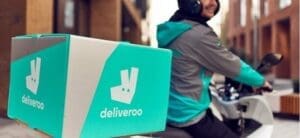 In May of 2019, Deliveroo announced it had raised a $575 million funding round led by Amazon. Just two months later the UK’s Competition and Markets Authority (CMA) put the deal on hold and launched a formal probe to explore anti-competition implications. Since then, two provisional findings indicated the deal should be approved, but it was still on hold. Finally, more than a year after the initial funding round, the CMA has officially announced that Amazon has been given approval to buy a minority 16 percent stake in Deliveroo. The provisional findings were based on concerns that Deliveroo would faulter without the influx of cash. Once the food delivery market recovered, however, the CMA switched their focus back to whether the deal would hamper competition in restaurant and online grocery delivery. As the deal moves forward, the CMA has warned Amazon that increasing its control of Deliveroo could trigger further investigation.
In May of 2019, Deliveroo announced it had raised a $575 million funding round led by Amazon. Just two months later the UK’s Competition and Markets Authority (CMA) put the deal on hold and launched a formal probe to explore anti-competition implications. Since then, two provisional findings indicated the deal should be approved, but it was still on hold. Finally, more than a year after the initial funding round, the CMA has officially announced that Amazon has been given approval to buy a minority 16 percent stake in Deliveroo. The provisional findings were based on concerns that Deliveroo would faulter without the influx of cash. Once the food delivery market recovered, however, the CMA switched their focus back to whether the deal would hamper competition in restaurant and online grocery delivery. As the deal moves forward, the CMA has warned Amazon that increasing its control of Deliveroo could trigger further investigation.
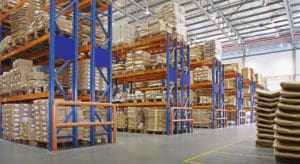 The ongoing coronavirus pandemic has led to a dramatic shift in shopping behavior with e-commerce sales booming while brick and mortar sales are declining. Now, retailers are busy trying to secure additional warehouse space in preparation for the holiday season. While many retailers will be scrambling to import the items they will need, they will also be scrambling to secure more warehouse space in locations closer to population centers. With warehouse demand soaring it will not be surprising to see more interest from on-demand warehouse companies such as Ware2Go, Flex, Flowspace, and Stord.
The ongoing coronavirus pandemic has led to a dramatic shift in shopping behavior with e-commerce sales booming while brick and mortar sales are declining. Now, retailers are busy trying to secure additional warehouse space in preparation for the holiday season. While many retailers will be scrambling to import the items they will need, they will also be scrambling to secure more warehouse space in locations closer to population centers. With warehouse demand soaring it will not be surprising to see more interest from on-demand warehouse companies such as Ware2Go, Flex, Flowspace, and Stord.
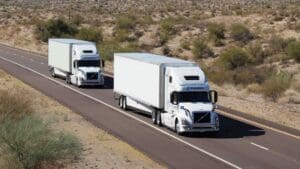 Truck platooning has gained steam in recent years as more tests have been run across the country. In platooning, trucks are connected using direct vehicle to vehicle communication. This allows the rear truck to react nearly simultaneously to the actions of the front truck. They do this in order to create drafting, which creates fuel savings. California Partners for Advanced Transportation Technology (PATH), a research and development program of the University of California, Berkeley, was selected from among three research organizations that participated in Phase 1 of the Federal Highway Administration’s (FHWA) Truck Platooning Early Deployment Assessment. California PATH partners in the project include Volvo Group, I-10 Corridor Coalition, California Highway Patrol, Cambridge Systematics, and Westat. The proposed platooning location is in California and Arizona, according to FHWA.
Truck platooning has gained steam in recent years as more tests have been run across the country. In platooning, trucks are connected using direct vehicle to vehicle communication. This allows the rear truck to react nearly simultaneously to the actions of the front truck. They do this in order to create drafting, which creates fuel savings. California Partners for Advanced Transportation Technology (PATH), a research and development program of the University of California, Berkeley, was selected from among three research organizations that participated in Phase 1 of the Federal Highway Administration’s (FHWA) Truck Platooning Early Deployment Assessment. California PATH partners in the project include Volvo Group, I-10 Corridor Coalition, California Highway Patrol, Cambridge Systematics, and Westat. The proposed platooning location is in California and Arizona, according to FHWA.
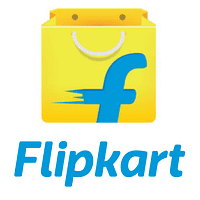 More and more e-commerce companies are pushing for faster, more convenient delivery timeframes for customers. Bangalore, India-based e-commerce company Flipkart has announced the launch of a new hyper-local delivery service dubbed Flipkart Quick. The service will build on the infrastructure in place to make more than 2,000 products available for delivery in just 90 minutes. Consumers can choose to order in the next 90 minutes or book a 2-hour slot as per their convenience. Customers can place orders anytime of the day, and get their orders delivered between 6am to midnight. Consumers will, however, have to pay a minimum delivery fee of ₹29.
More and more e-commerce companies are pushing for faster, more convenient delivery timeframes for customers. Bangalore, India-based e-commerce company Flipkart has announced the launch of a new hyper-local delivery service dubbed Flipkart Quick. The service will build on the infrastructure in place to make more than 2,000 products available for delivery in just 90 minutes. Consumers can choose to order in the next 90 minutes or book a 2-hour slot as per their convenience. Customers can place orders anytime of the day, and get their orders delivered between 6am to midnight. Consumers will, however, have to pay a minimum delivery fee of ₹29.
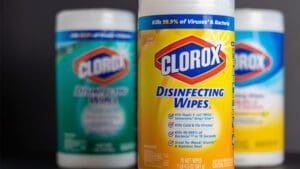 As the COVID-19 pandemic stretched beyond its first month, many products were becoming increasingly difficult to come by. Some of the most sought-after products included toilet paper, hand sanitizer, and disinfectant wipes. And while some of these products have become easier to find, disinfectant wipes remain elusive. Clorox, the world’s largest manufacturer of disinfectant cleaning products does not see the shortage ending soon. According to the company, with cold and flu season coming in the middle of the year, and the coronavirus pandemic expected to be here for the long haul, it will take a full year to get supply levels back to normal. This means that the disinfectant wipe shortage will run some time in to 2021, with no end really in sight.
As the COVID-19 pandemic stretched beyond its first month, many products were becoming increasingly difficult to come by. Some of the most sought-after products included toilet paper, hand sanitizer, and disinfectant wipes. And while some of these products have become easier to find, disinfectant wipes remain elusive. Clorox, the world’s largest manufacturer of disinfectant cleaning products does not see the shortage ending soon. According to the company, with cold and flu season coming in the middle of the year, and the coronavirus pandemic expected to be here for the long haul, it will take a full year to get supply levels back to normal. This means that the disinfectant wipe shortage will run some time in to 2021, with no end really in sight.
![]() Walmart has been aggressive in its quest to catch up to e-commerce rival Amazon. One of the big advantages for Amazon has been its Prime program. Walmart unveiled its answer to the program: Walmart+. The program will cost $98 a year and will include perks such as same-day delivery of groceries and general merchandise, discounts on fuel at Walmart gas stations, and early access to product deals. The service was initially planned to launch in the March / April timeframe, but was pushed off until July due to the coronavirus pandemic. And now, the program is getting pushed back again. As of now, there is no timeframe set for the program to launch, nor is it known if it will roll out nationally or regionally. Even without the program, the pandemic has given Walmart a surge in e-commerce order volumes.
Walmart has been aggressive in its quest to catch up to e-commerce rival Amazon. One of the big advantages for Amazon has been its Prime program. Walmart unveiled its answer to the program: Walmart+. The program will cost $98 a year and will include perks such as same-day delivery of groceries and general merchandise, discounts on fuel at Walmart gas stations, and early access to product deals. The service was initially planned to launch in the March / April timeframe, but was pushed off until July due to the coronavirus pandemic. And now, the program is getting pushed back again. As of now, there is no timeframe set for the program to launch, nor is it known if it will roll out nationally or regionally. Even without the program, the pandemic has given Walmart a surge in e-commerce order volumes.
![]() Want to learn more about inventory optimization and omni-channel fulfillment? On Wednesday, August 19, Steve Banker and I will join Scott Fenwick, Sr. Director, Product Management for Inventory at Manhattan Associates to explore the impact of omni-channel fulfillment on supply chain planning. Register now.
Want to learn more about inventory optimization and omni-channel fulfillment? On Wednesday, August 19, Steve Banker and I will join Scott Fenwick, Sr. Director, Product Management for Inventory at Manhattan Associates to explore the impact of omni-channel fulfillment on supply chain planning. Register now.
That’s all for this week. Enjoy the weekend and the song of the week, One by the U2.

















